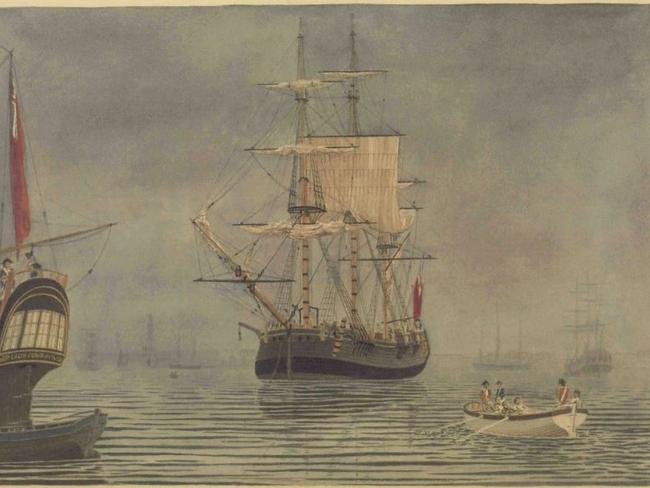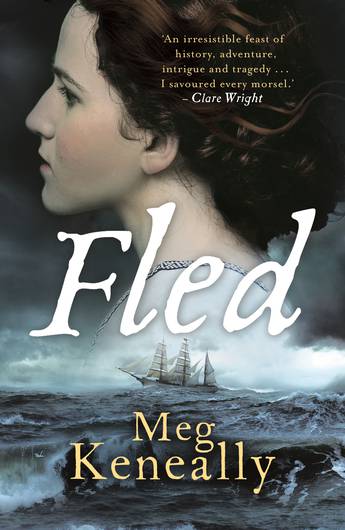Fled is based on the
life of Mary (Dabby) Bryant, the woman behind one of history’s most daring
escapes. Sentenced to seven years transportation to Australia, she escaped from
the colony and sailed over 3,000 miles for 66 days in a stolen open boat with
her husband, two children and other companions to West Timor (Coepang as it was
then called). Here she was discovered, arrested and returned to Britain to be
incarcerated until she was taken up as a cause célèbre by James Boswell who set
her up in a house and sent her a stipend after she returned to Cornwall. In an
Author’s Note, Meg Keneally stresses that this is a work of fiction, which is
why she has changed some elements of the story, including names of the
characters – Mary Bryant becomes Jenny Trelawny, later Gwynn after marrying Dan
Gwynn.
The first part of the novel
concerns Jenny’s route to crime and the highway robbery for which she was
transported to the other side of the world. There is a detailed account of that
trip on the Charlotte, on which she conceives
and after which her daughter is named. She befriends Captain James Corbett,
whose character is based on that of Watkin Tench, who tells her, “We don’t need
to remake Newgate on the other side of the world. Well, I imagine there will be
a guard house, or something like it. I’m sure that not everybody has left their
criminal disposition back in England. But the entire place is intended as a
prison. We’ll have no need of walls for the most part, it is to be hoped. We’ll
have the ocean.”
 |
| The Charlotte at Portsmouth, May 1787 from Frank Allen's The Ships of the First Fleet |
Life in this colony is brutish
and cruel, as it is intended to be, in a land that must seem upside-down. The
triangle that is used for the floggings is “an ominous symbol, a profane and
subverted trinity.” To save herself from rape and degradation by the male convicts
and soldiers, she marries Dan and has another child, Emmanuel (these were the
real names of Mary Bryant’s children). Married couples are given separate
quarters but others, jealous of what they perceive to be her advantages, strive
to bring her low. When their actions result in Jenny being expelled to the
women’s camp, she reflects, “While space was the only blessing this colony
provided in abundance, it was one of the many denied to the hut convicts. Jenny
now lived in a place of wails and screams and sobs and fights, of stench upon
stench, of dangers buried in innocent conversation.”
From the moment she lands in Botany
Bay, Jenny knows she wants to leave, and it soon becomes apparent that their
best chance of survival is escape. Food is scarce, supply ships are absent, farming
is in its infancy, and provisions are rapidly dwindling; making theft of food a
hanging offence and starving to death a distinct possibility. Perhaps if the
settlers had collaborated with the local people they might have had better
chances of survival, but there is limited interaction between the white settlers
and the Indigenous tribes. Jenny encounters an Aboriginal woman who shows her
what leaves to chew or to brew to avoid scurvy. Although these are plentiful,
Jenny guards this knowledge as currency, as she does when the Indigenous people
take her fishing and share their methods with her.
Questions have been asked as to
why Mary Bryant would risk a journey for herself and her children on the ocean
and potential drowning. As well as starvation, the new colony is rife with
disease (particularly smallpox) and the dangers to the women convicts are
manifold. “Emmanuel’s death at sea is a possibility. His death here is nigh on
certain.”
 |
| 1930s era illustration of the convict escape |
Eventually she returns to her family in Cornwall. She had been afraid of their reaction, but they are thrilled to see her and welcome her back, so the story has come full circle. This is one of the bits that the author has invented, but it makes for a satisfying conclusion. Mary Bryant’s adventure is a fascinating story and, although she has changed the names to compensate for lack of certain facts, Meg Keneally has told it with drama and compassion.

No comments:
Post a Comment